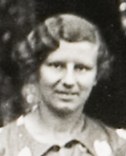Joan Curran
| Joan Curran | |
|---|---|

Joan Curran at Newman College
|
|
| Born |
26 February 1916 Swansea, Wales |
| Died | 10 February 1999 (aged 82) Glasgow, Scotland |
| Residence | United Kingdom |
| Nationality | British |
| Institutions |
Cavendish Laboratory Telecommunications Research Establishment Lawrence Berkeley National Laboratory |
| Alma mater | University of Cambridge (B.A., M.A.) |
| Known for | Invention of chaff |
Joan Elizabeth Curran (26 February 1916 – 10 February 1999) was a Welsh scientist who played important roles in the development of radar and the atomic bomb during the Second World War. She invented chaff, a radar countermeasure technique credited with reducing losses among Allied bomber crews. She also worked on the development of the proximity fuse and the electromagnetic isotope separation process for the atomic bomb.
Joan Elizabeth Strothers was born on 26 February 1916 in Swansea, Wales, the daughter of an optician, Charles William Strothers, and his wife, Margaret Beatrice, née Millington. She was educated at Swansea Girls' High School, and in 1934 won an open scholarship to Newnham College, Cambridge. In 1935, she rowed for the ladies' university eight, in the first real Women's boat race against Oxford. She gained an honours degree in physics, which was not awarded because it was before women were allowed Cambridge degrees. In her seventies, in 1987, she was honoured with the degree of Doctor of Laws honoris causa by the University of Strathclyde.
Strothers, who "had the scientific equivalent of gardening green fingers", was awarded a government grant to study for a higher degree, and elected to go to the Cavendish Laboratory at Cambridge, where she joined Sam Curran in a team under the direction of Philip Dee. She soon established a reputation for "extreme dexterity and being outstandingly neat and skilful in the deployment of equipment." In 1939, Dee proposed that the team spend a month at the Royal Aircraft Establishment at Farnborough Airfield. They arrived on 1 September 1939. Two days later, Britain declared war on Germany, and Britain entered the Second World War.
...
Wikipedia
